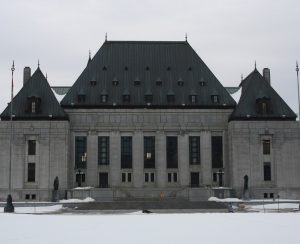
by Becky Lockert
This past fall, the Supreme Court of Canada granted the Asper Centre leave to intervene in R v Bird, a case that ties questions of access to justice and constitutionalism to the doctrine of collateral attack. The question at the heart of the case is, from the Asper Centre’s perspective, whether a court applying the collateral attack doctrine must explicitly consider countervailing factors to ensure that administrative orders are Charter compliant.
Mr. Bird, the appellant, was labelled a long-term offender and, upon the completion of his prison sentence, was subject to certain supervisory conditions. Although he had requested that he be released into his First Nations community, the Parole Board ordered Mr. Bird to reside in a community correctional facility. Notably, this community correctional facility is the same one where he served the end of his prison sentence.
On a January evening two years ago, Mr. Bird left his assigned correctional facility and did not return. Police apprehended Mr. Bird several months later, leading to a charge of breaching a long-term supervision order and the threat of up to ten years in prison.
At trial, Mr. Bird successfully argued that the imposition of the residency condition was contrary to s. 7 of the Charter and outside the statutory authority of the Parole Board, because continued incarceration cannot be a condition imposed by a long-term supervision order. Allowing the appeal, the Saskatchewan Court of Appeal held that Mr. Bird was precluded from challenging the legality of the supervision order condition. To make such an attack, the Court of Appeal concluded, would be allowing a collateral attack and contrary to legislative intent.
The Supreme Court granted leave to intervene to the Asper Centre in September 2017. The intervention team, consisting of Cheryl Milne (Asper Centre Executive Director) , Breese Davis (the Asper Centre’s 2017-18 Constitutional Litigator-in-Residence), and five clinic students, had six weeks to prepare our intervenor factum. Our task was to craft an argument that the Court, when determining whether to bar a collateral attack, should consider both the constitutionality of the administrative order and access to justice.
Cheryl and Breese immediately gave the reins to our small group of students. Gaining familiarity with the subject-matter was our first step; we assigned out research and set off to produce memos. Meeting regularly and communicating constantly, the group narrowed our issues and determined our approach. We would advocate for adding two branches to the collateral attack framework (from the Supreme Court’s judgment in R v Consolidated Maybrun Mines Ltd.).
First: courts cannot be complicit in the enforcement of unconstitutional administrative orders by refusing collateral attack against them. This would be contrary to the rule of law and the principle of constitutionalism. Especially in this case, where Mr. Bird’s liberty interest is at stake, compliance with the Charter cannot be left out from the Court’s analysis.
Second: courts should take note of access to justice challenges that make judicial review of administrative orders essentially inaccessible. Charter protections cannot be rendered meaningless by an effective inability to challenge potentially unconstitutional conditions.
Having determined our strategy, the drafting process began. For a number of us, this was to be our first factum. Cheryl and Breese put great faith in the group to craft the Centre’s written argument, providing helpful (and at times, challenging) feedback to our work-in-progress. The ability to maximize on Cheryl’s expertise in drafting intervenors’ facta and Breese’s wealth of knowledge as a seasoned criminal defence lawyer was immeasurably helpful. There were a series of late nights at the Faculty, including line-by-line group editing sessions where we wrote and re-wrote sections of the factum.
Following a series of drafts, more line-by-line edits, and finally a submission to Cheryl and Breese, we had our finished product. A few final tweaks on their end, and the factum was submitted to the Court and out of our hands.
The prospect of the Supreme Court reading our writing is a daunting one for students – daunting, but exciting. The Court will be hearing oral submissions on the case this upcoming March, and many of our student group will be coming along to see our arguments in action. How will the Court approach our arguments? Is our position persuasive, and will the Court accept the position that access to justice and constitutionalism must be considered?
Having this opportunity to draft an intervenor factum has been invaluable for our student group. On a personal note, I can attest to this being the most meaningful and challenging part of my law school career thus far. Being surrounded by four other dedicated and bright law students and having guidance from highly skilled supervising lawyers has resulted in a piece of work and an experience that I am proud to have been a part of.
Becky Lockert is a 2L JD Candidate at the Faculty of Law and was a student in the Asper Centre Clinical Legal Education Course.
